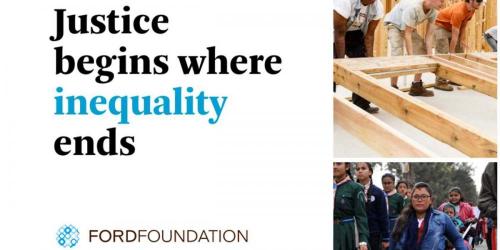
https://www.fordfoundation.org/news-and-stories/news-and-press/news/ford...
The initiative lays the groundwork for interrelated yet localized resource hubs in Brazil, Colombia, Costa Rica, Indonesia, Kenya, Lebanon, Mexico, Nigeria, Peru, South Africa, Tanzania, and Uganda so that organizations can empower each other with the expertise and tools they need to build and sustain social change. Regional organizations will house and lead the hubs, so leadership comes directly from affected communities instead of from the Global North. Additionally, a handful of cross-regional and global organizations will provide similar services from their regional offices.
“At the Ford Foundation, we believe that the people closest to a problem are also closest to its solution. We must listen to and learn from the individuals, communities, and organizations who have been courageously leading the way for years—particularly in the Global South, where civil society operates with insufficient resources, and yet, their resilience is more important than ever,” said Darren Walker, president of the Ford Foundation.
Across the world, especially in the Global South, there has been a rise in authoritarianism and a compounding decrease in democratic values, which are collectively deepening inequality. Since March 2020, 155 countries have placed new restrictions on public assemblies, while barely 3% of the world’s population lives in countries that are considered to have open civic space.
The resource hubs will become centers of excellence for civil society resilience in their respective regions, providing strategic assistance and guidance on security and institutional adaptability. Each will be grounded in its unique local context, meeting the greatest areas of need for the continuance of civil society: institutional resilience, strategic relevance, and holistic well-being.
- Institutional resilience: Civil society organizations in the Global South operate within a web of complex and rapidly changing standards—from convoluted tax laws to undue audits and inspections. Authoritarian governments weaponize these regulations to denigrate civil society and force organizations into closure. As a result, civil society is forced to dedicate their time and resources to navigating these financial and legal obstacles in order to simply survive—often at the cost of their day-to-day operations.
- Strategic relevance: Undemocratic regimes frequently frame civil society organizations as agents of foreign interests or enemies of the very communities they serve. These attacks are designed to delegitimize, and they require a coordinated response that can both counter misrepresentation and present new, creative, and proactive strategies for change.
- Holistic well-being: Civil society organizations face challenges not only to their operations but to their team members’ very lives and livelihoods. In nations across the Global South, these threats are imminent and include everything from physical and emotional strain to security threats against staff and their families.
“Stemming from the Weaving Resilience initiative, Enlaza Sur is the Andean Region Service Hub for Colombia, Peru and Venezuela. While led by Dejusticia and Compartamos con Colombia, the Hub was co-created and will be implemented by a wide array of partners, technical allies and strategic stakeholders devoted to strengthening civil society and community-based organizations looking to maximize social justice and environmental impact. Designed to gather different voices and views through a collaborative and inclusive approach, Enlaza Sur will help build an articulated and sustainable ecosystem of resilient social organizations in the Andean region,” said Nicolas Salcedo, Executive Director Compartamos con Colombia.
“Weaving Resilience will build resilient and impactful institutions that center transcendent values like justice and human dignity, with an explicit commitment to an expansive analysis of voice, rights, and power. It is a natural complement to the foundation’s long-standing commitment to provide flexible and multi-year support to those fighting for social justice,” said Helena Hofbauer Balmori, international program director for Civic Engagement and Government at Ford Foundation.
For more information on Weaving Resilience, click here.
Press Line
Tel (+1) 212-573-5128
Fax (+1) 212-351-3643
pressline@fordfoundation.org
The Ford Foundation is an independent organization working to address inequality and build a future grounded in justice. For more than 85 years, it has supported visionaries on the frontlines of social change worldwide, guided by its mission to strengthen democratic values, reduce poverty and injustice, promote international cooperation, and advance human achievement. Today, with an endowment of $16 billion, the foundation has headquarters in New York and 10 regional offices across Africa, Asia, Latin America, and the Middle East.










Add new comment